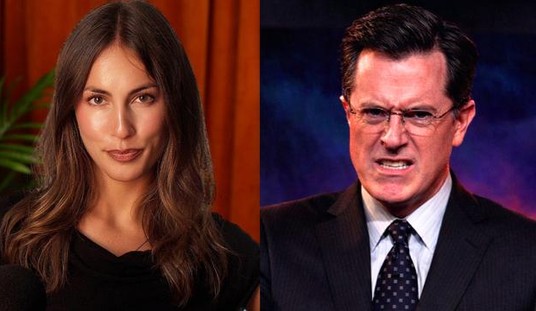On Saturday, an unnamed woman accused actor and comedian Aziz Ansari of sexual assaulting her on a date last September. She never claimed Ansari abused any sort of employment power or position over her, and she clearly appeared to consent to some sort of sex before later refusing. What Ansari did was wrong — but it seems to have fallen within the rules of modern romance.
Indeed, this case might represent a major backlash against the excesses of the #MeToo movement against sexual assault. The Ansari accusations represent a defining moment: Will #MeToo remain focused on clear cases of men physically assaulting or abusing their power over women, or will it devolve into a feminist witch hunt?
Babe’s Katie Way reported the allegations this weekend. The anonymous woman — whom Way referred to as “Grace” — met Ansari at the 2017 Emmy Awards last September and went on a date with him about a week later.
After drinking wine at Ansari’s apartment, they walked to an oyster bar, and Grace said the actor made it clear he was anxious to leave. She recalled him saying, “Let’s get off this boat.”
Grace went back with him to his apartment, and he started kissing her soon thereafter. “In a second, his hand was on my breast,” she said. He started undressing her, then himself. The article recalled, “She remembers feeling uncomfortable at how quickly things escalated.”
Only when Ansari said he was going to grab a condom did Grace respond with “something like, ‘Whoa, let’s relax for a sex [sic], let’s chill.'” Then he started kissing her again, performed oral sex on her, and asked her to return the favor. She did.
Grace alleged that Ansari kept directing her hand toward his crotch throughout the night. She recalled trying to move away from him, and him following her.
“Throughout the course of her short time in the apartment, she says she used verbal and non-verbal cues to indicate how uncomfortable and distressed she was,” the article reported. Grace recalled it this way, “Most of my discomfort was expressed in me pulling away and mumbling. I know that my hand stopped moving at some points. I stopped moving my lips and turned cold.”
“I know I was physically giving off cues that I wasn’t interested. I don’t think that was noticed at all, or if it was, it was ignored,” she said.
According to Grace’s story, Ansari was desperate for sex, and kept asking her, “Where do you want me to f**k you?” She seems to have dodged the question, until at some point she remembered saying, “Next time.” His response? “Oh, you mean a second date?” Then he suggested, “Well, if I poured you another glass of wine now, would that count as a second date?”
Grace said she excused herself to the bathroom after he poured another glass of wine. When she came back, she said, “I don’t want to feel forced because then I’ll hate you, and I’d rather not hate you.” He agreed, “Oh, of course, it’s only fun if we’re both having fun.”
Later, by the couch, he asked her to give him oral sex again. She consented. “He sat back and pointed to his penis and motioned for me to go down on him. And I did. I think I just felt really pressured. It was literally the most unexpected thing I thought would happen at that moment because I told him I was uncomfortable,” Grace recalled.
Both naked, Ansari allegedly pushed himself against her and started miming sex. She put a hard stop to it, they put their clothes back on and watched an episode of Seinfeld, and then she left.
Grace later sent a text message to Ansari, explaining, “Last night might’ve been fun for you, but it wasn’t for me. … You ignored clear non-verbal cues; you kept going with advances.” She concluded with, “I want to make sure you’re aware so maybe the next girl doesn’t have to cry on the ride home.”
“I’m so sad to hear this,” he responded. “Clearly, I misread things in the moment and I’m truly sorry.”
Only later did Grace come to the realization that Ansari’s moves constituted assault in her eyes. “It took a really long time for me to validate this as sexual assault,” she told Babe. “I was debating if this was an awkward sexual experience or sexual assault. And that’s why I confronted so many of my friends and listened to what they had to say, because I wanted validation that it was actually bad.”
According to Grace’s account, Ansari was indeed pressuring her to have sex, and he clearly went too far. None of that constitutes assault, however. Grace had given Ansari multiple “non-verbal cues” that she was interested in having sex with him. When he started kissing her, she seems to have responded in kind. She did not resist when he took her clothes off, or when he removed his own. She did not resist when he started performing oral sex on her, and she actually returned the favor.
From that point onward, Ansari clearly had the impression that Grace wanted to have sex with him. Even if she was “uncomfortable” from the beginning, she could easily have merely said “please stop” or “I don’t want to have sex with you.” From the report about the two times she did actually express hesitation, it seems Ansari would have restrained himself.
The Ansari story sparked a commotion on Twitter.
“This baseless attack on Aziz Ansari trivializes the #MeToo movement. #WitchHunt,” tweeted Christina Hoff Sommers, a scholar at the American Enterprise Institute.
This baseless attack on Aziz Ansari trivializes the #Metoo movement. #WitchHunt https://t.co/Z5EUhCUEZJ
— Christina Sommers 🧢 (@CHSommers) January 14, 2018
“Hon, giving a blow job might make the guy think you’re, I don’t know, into the WHOLE thing? This story is mostly about a real life experience with a male star not meeting a woman’s romantic expectations,” RedState’s Kimberly Ross tweeted. “Sloppy sex/bad sex isn’t the same as ‘he raped me!’ You make a mockery of a movement that includes actual sexual assault victims. So stop. Not everything is rape or assault.”
https://twitter.com/SouthernKeeks/status/952679750098710528
The Federalist’s Inez Stepman agreed. “If that Aziz Ansari story is rape then everyone who has been on the modern dating scene has been both victim and perpetrator,” she tweeted. “You all said you didn’t want courtship, you wanted sexual liberation. Welcome.”
If that Aziz Ansari story is rape than everyone who has been on the modern dating scene has been both victim and perpetrator. You all said you didn't want courtship, you wanted sexual liberation. Welcome.
— Inez Stepman (@InezFeltscher) January 14, 2018
Some defended Grace’s allegations, however. Feminist writer Jessica Valenti argued, “A lot of men will read that post about Aziz Ansari and see an everyday, reasonable sexual interaction. But part of what women are saying right now is that what the culture considers ‘normal’ sexual encounters are not working for us, and oftentimes harmful.”
https://twitter.com/JessicaValenti/status/952568652066443264
Actress Izzie Steele also attacked Ansari. “To those who think the Aziz Ansari account was just a bad date…that is equal parts heartbreaking and horrifying. What do women have to say, scream, go through to have you change your understanding of what’s acceptable?” she asked.
To those who think the Aziz Ansari account was just a bad date…that is equal parts heartbreaking and horrifying. What do women have to say, scream, go through to have you change your understanding of what’s acceptable?
— Izzie Steele (@izneverdone) January 14, 2018
Perhaps women like Grace could just say “no”? What a concept.
Arjun Sethi, a Georgetown Law professor, gave a tragically tone-deaf response to the situation. “People are so quick to defend Aziz Ansari & so willing to doubt his accuser. One gets sympathy & the other antipathy. That’s what rape culture is all about,” Sethi tweeted.
People are so quick to defend Aziz Ansari & so willing to doubt his accuser. One gets sympathy & the other antipathy. That's what rape culture is all about.
— Arjun Sethi (@arjunsethi81) January 14, 2018
To clarify, those who defend Ansari against allegations are believing Grace’s story. Ansari has not yet responded to the claims. The dispute is not about what happened, but about whether what happened constitutes sexual assault. Women like Sommers, Ross, and Stepman did not doubt Grace’s account — they merely pointed out that Ansari did not assault her.
A staff editor and writer for The New York Times, Bari Weiss, attacked the claims as “deeply irresponsible journalism.”
This Aziz Ansari story is deeply irresponsible journalism.
— Bari Weiss (@bariweiss) January 14, 2018
If even The New York Times is dismissing the allegations as Fake News, Ansari seems to have little to worry about.
Perhaps conservative blogger Matt Walsh said it best:
Here’s the reality: a woman went back to a strange man’s apartment and willingly engaged in various sex acts multiple times. She could have left but chose not to. She could have stopped but chose to continue. She may say now that she was “reluctant” but her reluctance does not make the man a rapist. She may have told him she was apprehensive but then she continued right along anyway. Take some responsibility. And, by the way, if you’re really reluctant about having sex with a guy you don’t know, here’s the best strategy: don’t go back to his apartment in the first place.
The most terrifying part of this story may be the woman’s denial of her own agency. She claims she resisted when she did not. She claims Ansari assaulted her by acting on his own desires and interpreting her decision to give him oral sex as an invitation.
This is truly dangerous thinking. Women like Grace have agency. They have the ability to say “no.” They can refuse to go up to the apartment. They can turn back kisses. They can resist being undressed, and they can certainly refuse to give and receive oral sex.
For Aziz Ansari to be guilty of assaulting her, Grace’s agency in all of these acts has to be denied. Is she really claiming she wasn’t able to refuse these advances? The sexual revolution was supposed to empower women.
Aziz Ansari was clearly no gentleman, but in order for the #MeToo movement to restrain real abuses, “sexual assault” has to mean something.









Join the conversation as a VIP Member